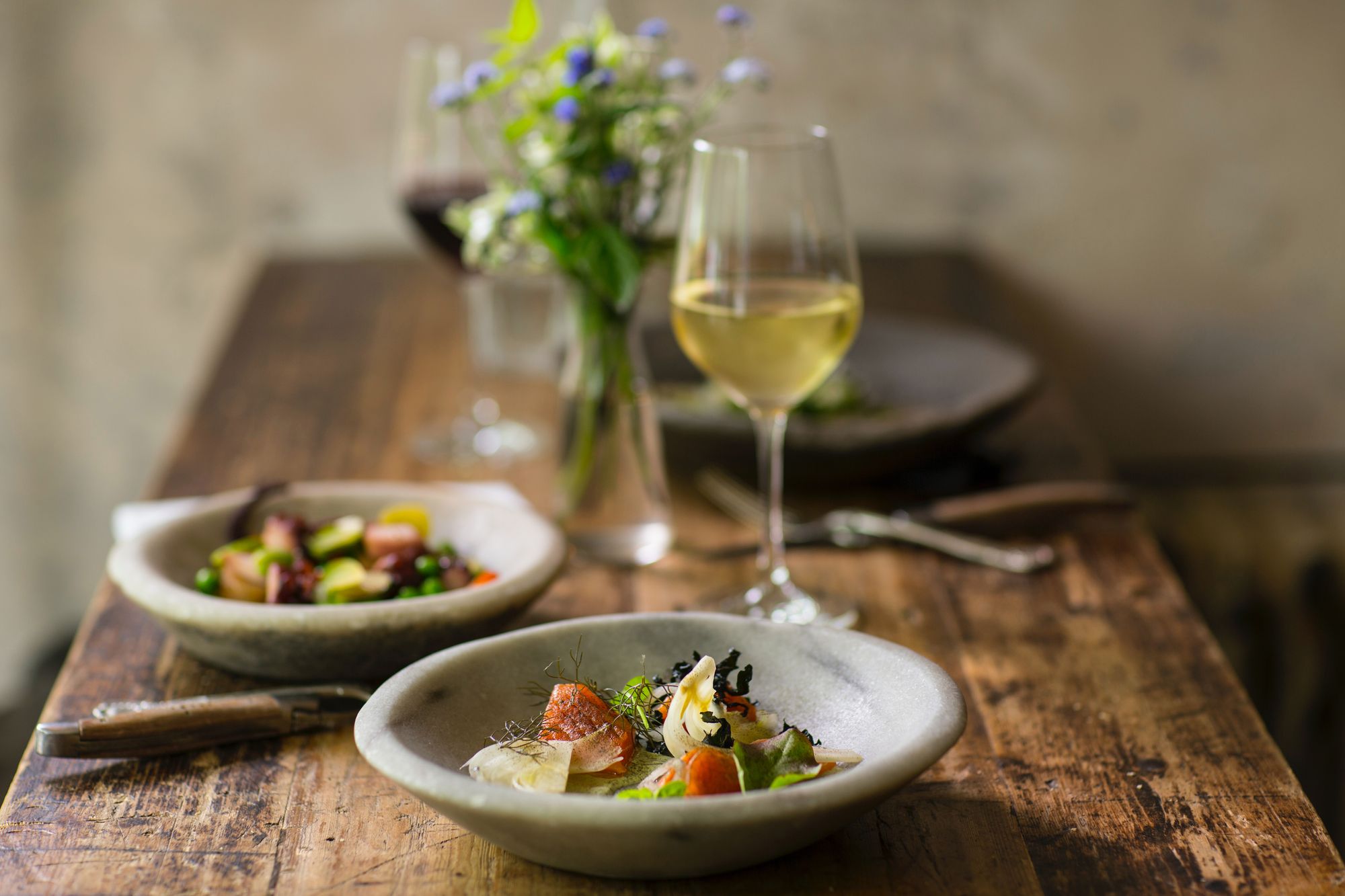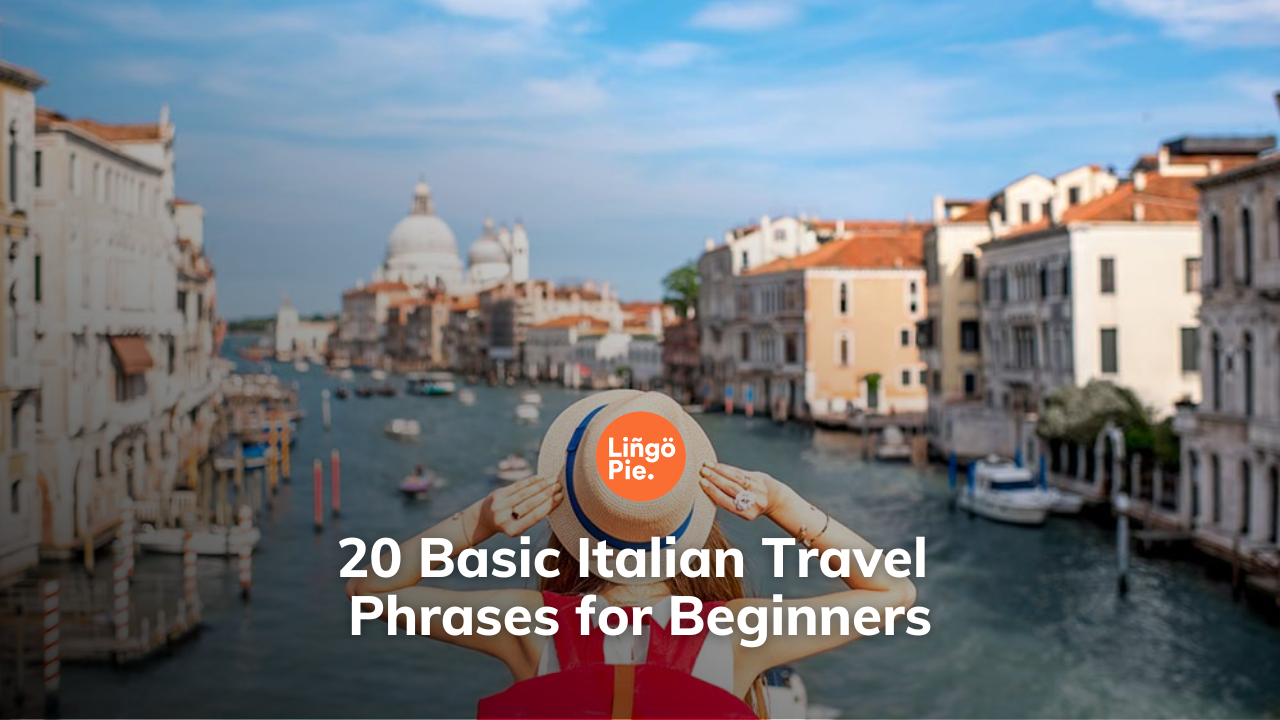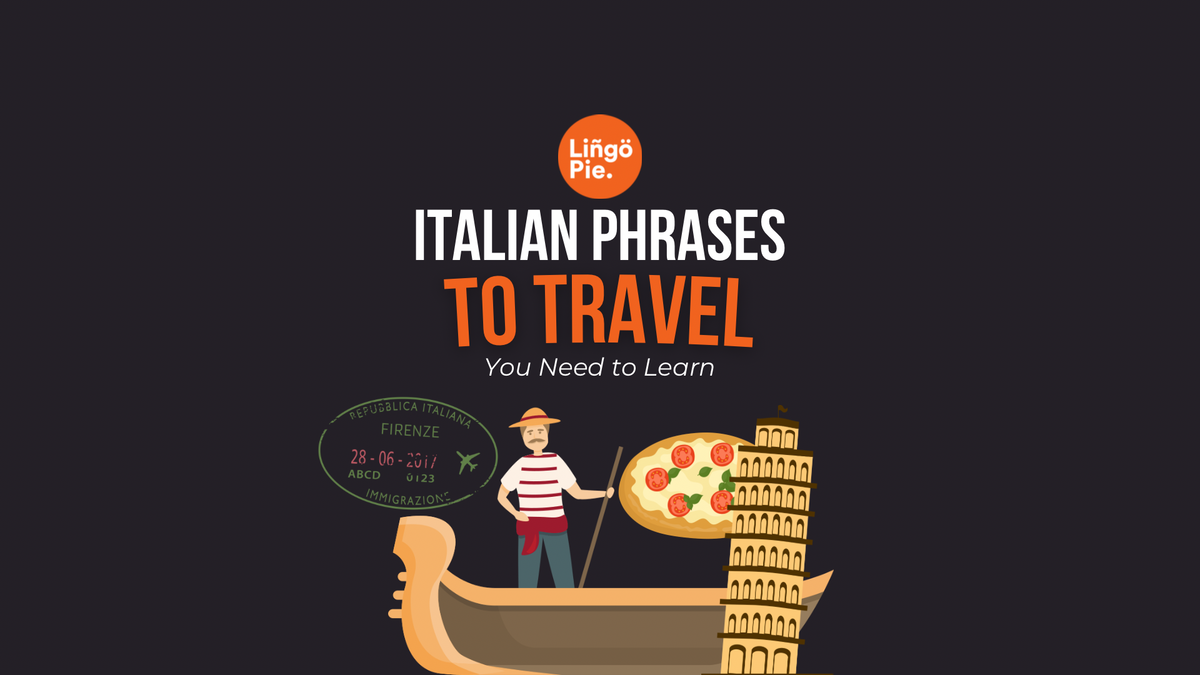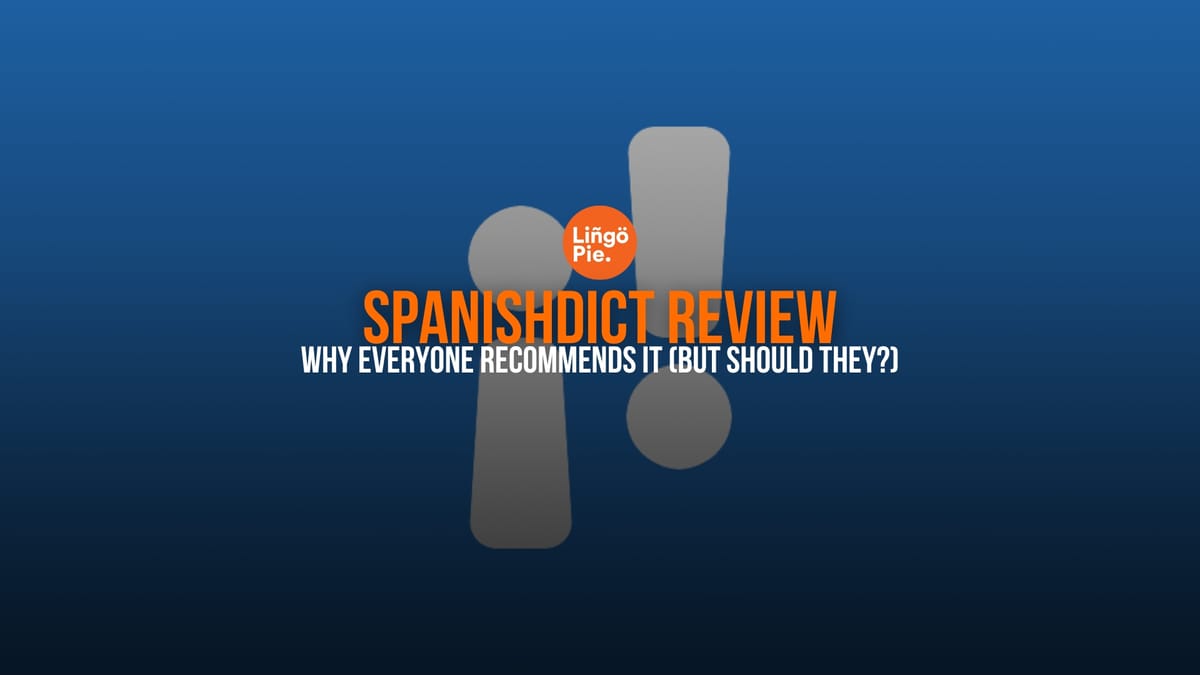Ciao amici! Whether it’s buon giorno or buona notte where you are, this guide is here to be your ultimate travel and language companion for Italy. If you’re planning your next trip to the land of pizza, pasta, and gelato, you’re in the right place. From your very first espresso order to asking for directions in charming cobblestone streets, we’ve gathered all the essential Italian vocabulary and phrases you’ll need.
Not packing your bags just yet? No problem. These Italian basics are just as helpful for learners at home who want to practice speaking like a local. And if you’re just starting your Italian language journey, be sure to check out our Best Way to Learn Italian on Your Own guide—it’s full of tips to help you progress fast.
Wherever you are in your Italian-learning adventure, these phrases will be your ticket to sounding confident, making connections, and enjoying Italy to the fullest. Va bene? Let’s dive in!

How Basic Italian Phrases Unlock Italy’s True Charm
When you learn a few basic Italian phrases, you’re not just preparing to ask for directions or order a gelato—you’re opening the door to one of the world’s richest cultural experiences. Recent research by Datappeal shows that Italy’s cultural attractions score an impressive 92 out of 100 for visitor sentiment, with couples making up 45% of cultural tourists, families 29%, groups 14%, and solo travelers 12%. These numbers highlight how deeply people of all backgrounds are drawn to Italy’s historic streets, art-filled piazzas, and timeless traditions.
Speaking even a little Italian instantly transforms these encounters: locals are more likely to open up, share stories, and offer insider tips. In other words, a simple “Buongiorno!” can turn a quick transaction into a memorable moment of connection—something that statistics show is at the very heart of what travelers love most about Italy’s cultural appeal.
Basic Italian Phrases for Travel
To begin with, let's learn the most basic Italian words.
You'll find the word or phrase in Italian, followed by its English translation.
- Si – Yes
- No – No
- Per favore – Please
- Grazie – Thank you
- Grazie mille – Thank you very much
- Prego – You’re welcome
- Salute! – Cheers!
- Mi scusi – Excuse me (for attention) or I'm sorry
- Permesso – Excuse me (to pass by)
- Parli inglese? – Do you speak English?
- Non capisco – I don’t understand
- Mi dispiace – I’m sorry
- Non parlo Italiano – I don't speak Italian
- Non lo sò – I don't know

Italian Greetings and Farewells
Greetings
- Ciao – Hi / Hello (informal)
- Buongiorno – Good morning / Good day
- Buon pomeriggio – Good afternoon
- Buonasera – Good evening
- Salve – Hello (neutral/formal)
- Come stai? – How are you? (informal)
- Come sta? – How are you? (formal)
- Piacere di conoscerti – Nice to meet you (informal)
- Piacere di conoscerla – Nice to meet you (formal)
Farewells
- Arrivederci – Goodbye (formal or neutral)
- ArrivederLa – Goodbye (very formal)
- A presto – See you soon
- A dopo – See you later
- Ci vediamo – See you (informal)
- Buonanotte – Good night
Italian phrases to ask for help
- Aiuto! – Help
- Sono stato assalito – I've been robbed
- Ho perso... (e.g. il mio passaporto) – I've lost... (e.g. my passport)
- Ho bisogno di un dottore – I need a doctor
Essential Italian phrases for shopping
These Italian phrases for travel will be necessary in case you need to head to the supermarket or decide to go on a clothes shopping spree in the Italian capital of fashion, Milano.
Or, perhaps you just want to get your family some souvenirs. Now you'll be ready!
- I negozi – Shops
- Quanto costa? – How much is it?
- Quanto costa questo? – How much is this?
- Lo compro / lo prendo – I'll take it!
- È troppo caro – It's too expensive
- Non lo voglio, grazie – I don't want it, thank you
- Dove sono i camerini? – Where are the fitting rooms?
- Posso pagare con carta di credito? – May I pay with a credit card?
Sample Italian dialogue:
Seller: Buon giorno, cosa sta cercando? Good morning, what are you looking for?
Customer: Posso guardare? May I just look?
Seller: Sì, certo. Mi faccia sapere se ha bisogno di qualcosa. Yes, of course. Let me know if you need anything.
Customer: Certo, grazie. Sure, thank you.
Numbers in Italian (1–20)
Step into the world of Italian with confidence by mastering your numbers. These basics will come in handy whether you’re shopping at a market or ordering your favorite pasta.
1 – uno
2 – due
3 – tre
4 – quattro
5 – cinque
6 – sei
7 – sette
8 – otto
9 – nove
10 – dieci
11 – undici
12 – dodici
13 – tredici
14 – quattordici
15 – quindici
16 – sedici
17 – diciassette
18 – diciotto
19 – diciannove
20 – venti
Want to go beyond 20 and learn how Italian numbers work in larger contexts?
👉 Check out our full guide: Counting in Italian
How to Ask and Tell the Time in Italian
- Che ore sono? – What time is it?
- A che ora...? – At what time…?
- È l’una – It’s one o’clock
- Sono le due – It’s two o’clock
- Mezzogiorno – Noon
- Mezzanotte – Midnight
- E un quarto – Quarter past
- E mezza – Half past
- Meno un quarto – Quarter to
- Di mattina – In the morning
- Del pomeriggio – In the afternoon
- Di sera – In the evening
- Di notte – At night
- In punto – On the dot / sharp
- Tra cinque minuti – In five minutes
Italian phrases for restaurants
Let's face it, dining out in Italy is an inevitability if you go. So, you'll need to know these Italian words and phrases if you're ordering food at a restaurant.
Start to memorize this vocabulary as soon as you can!
- A glass / bottle – un bicchiere / una bottiglia
- Vino della casa – house wine
- Il menu, per favore – Can I see the menu, please?
- Il conto, per favore – Can I get the check, please?
- Vino rosso / vino bianco – red wine / white wine
- Dov’è il bagno? – Where is the restroom?
- Che cosa ci consiglia? – What do you recommend?
- Vorrei… – I would like…
- Sono allergico/a a… – I’m allergic to…
- La salsa è piccante? – Is the sauce spicy?
- Posso pagare con la carta? – May I pay by card?
- Un tavolo per due, per favore – A table for two, please
- Senza… per favore – Without… please
- Acqua naturale / frizzante – Still / sparkling water
- Possiamo avere un po’ di pane? – Can we have some bread?

Asking for directions in Italian
These extra travel phrases will help you navigate streets, stations, and signs with ease during your trip in Italy.
- Dov’è…? (e.g. la stazione) – Where is…? (e.g. the train station)
- Entrata – Entrance
- Uscita – Exit
- Sinistra – Left
- Destra – Right
- Dritto – Straight ahead
- Avanti – Forward
- Dietro – Back
- Vicino – Near
- Lontano – Far
- All’angolo – At the corner
- Attraversare – To cross (e.g. the street)
- La piazza – Square (town square)
- Il ponte – Bridge
- Il semaforo – Traffic light
Bargaining and Shopping in Italian
Whether you’re at a bustling Italian market or a boutique, these phrases will help you shop with confidence and maybe even score a bargain.
- Quanto costa? – How much does it cost?
- È troppo caro! – It’s too expensive!
- Mi può fare uno sconto? – Can you give me a discount?
- Posso pagare con la carta? – Can I pay by card?
- Solo in contanti – Cash only
- Lo prendo – I’ll take it
- Sto solo guardando – I’m just looking
- Ne ha uno più economico? – Do you have a cheaper one?
- Può incartarlo, per favore? – Can you wrap it, please?
- Ce l’ha in un’altra taglia? – Do you have it in another size?
- Ce l’ha in un altro colore? – Do you have it in another color?
- È in saldo? – Is it on sale?
- Il prezzo è trattabile? – Is the price negotiable?
- Posso provare questo? – Can I try this on?
- Dove posso trovare…? – Where can I find…?
Asking for Help in Italian
From getting directions to handling emergencies, these phrases will help you ask for assistance clearly and politely in Italy.
- Mi può aiutare? – Can you help me?
- Per favore, ho bisogno di aiuto – Please, I need help
- Può parlare più lentamente? – Can you speak more slowly?
- Non capisco – I don’t understand
- Dove si trova…? – Where is…?
- Mi sono perso/a – I’m lost
- Può mostrarmelo sulla mappa? – Can you show me on the map?
- C’è un medico vicino? – Is there a doctor nearby?
- Chiamate un’ambulanza! – Call an ambulance!
- C’è una farmacia qui vicino? – Is there a pharmacy nearby?
- Il mio telefono non funziona – My phone isn’t working
- Come si dice… in italiano? – How do you say… in Italian?
- Può ripetere, per favore? – Can you repeat, please?
- Sto cercando la stazione – I’m looking for the station
- C’è qualcuno che parla inglese? – Is there someone who speaks English?
Transportation In Italian (italian words for transport and getting around)
If you're looking to move from place to place, you'll need these Italian travel phrases to get by.
Particularly if you choose to get away from big cities and decide to go to the countryside where many Italians do not speak English.
- Biglietto – ticket
- Andata – one way
- Ritorno – return
- Il treno – the train
- Binario – platform
- Un taxi – taxi
- Autobus – bus
- Macchina – car
- Parcheggio – parking
- L'aeroporto – the airport
- Arrivo – arrival
- Partenza – departure
- La fermata dell'autobus – bus stop
- La stazione ferroviaria – the train station
- Orario – timetable / schedule

More Basic Italian phrases for getting around
- Dov'è la stazione? – Where is the train station?
- Dov'è la società di noleggio auto? – Where is the car rental company?
- Un biglietto del treno, per favore! – A train ticket, please!
- Da quale binario per Milano? – What platform for Milan?
Related:

Basic Italian Phrases for Making Friends
We encourage you to venture out of your comfort zone to make some new friends while you're visiting Italy. These key phrases may come in handy.
- Ciao! – Hi! / Bye!
- Come ti chiami? – What’s your name?
- Mi chiamo… – My name is…
- Piacere di conoscerti – Nice to meet you
- Di dove sei? – Where are you from?
- Sono di… – I’m from…
- Quanti anni hai? – How old are you?
- Che cosa ti piace fare? – What do you like to do?
- Anch’io! – Me too!
- Vuoi prendere un caffè insieme? – Do you want to get a coffee together?
- Hai Instagram? – Do you have Instagram?
- Sei simpatico/a – You’re nice / friendly
- È stato bello parlare con te – It was nice talking to you
- Ci vediamo presto – See you soon
- Tieniamoci in contatto – Let’s keep in touch
Sample Italian dialogue:
A: Ciao, come stai? – How are you?
B: Molto bene, grazie e tu? – Very well, thank you, and you?
A: Bene. Ti sta piacendo il tuo viaggio in Italia? – Good. Are you enjoying your trip to Italy?
B: Sì, mi piace molto. – Yes, I'm enjoying it very much.
Italian Conversation Starters
Break the ice in Italian with these easy openers for a friendly chat.
- Ciao, come va? – Hi, how’s it going?
- Come stai oggi? – How are you today?
- È la tua prima volta qui? – Is it your first time here?
- Che ne pensi di questo posto? – What do you think of this place?
- Hai qualche consiglio su cosa fare qui? – Do you have any tips on what to do here?
- Sei mai stato/a in…? – Have you ever been to…?
- Come conosci questo evento? – How do you know about this event?
- Vieni spesso qui? – Do you come here often?
- Cosa ti ha portato qui oggi? – What brought you here today?
- Ti piace vivere qui? – Do you like living here?
- Cosa fai di solito nei weekend? – What do you usually do on weekends?
- Ti piace la cucina italiana? – Do you like Italian food?
- Hai animali domestici? – Do you have pets?
- Cosa fai nel tempo libero? – What do you do in your free time?
- Hai qualche hobby interessante? – Do you have any interesting hobbies?
Introducing Yourself in Italian
Use these phrases to confidently tell people who you are and where you’re from.
- Mi chiamo… – My name is…
- Sono di… – I’m from…
- Vivo a… – I live in…
- Lavoro come… – I work as…
- Studio… – I study…
- Ho … anni – I am … years old
- Parlo… – I speak…
- Sono qui in vacanza – I’m here on holiday
- Sono qui per lavoro – I’m here for work
- È la mia prima volta in Italia – It’s my first time in Italy
- Mi piace viaggiare – I like to travel
- Sono appassionato/a di… – I’m passionate about…
- Vengo spesso qui – I come here often
- Ho sempre voluto visitare questo posto – I’ve always wanted to visit this place
- Abito qui da… – I’ve been living here for…
Italian Phrases for Small Talk
Keep the conversation flowing with these casual phrases for everyday topics.
- Che bel tempo oggi! – What nice weather today!
- Oggi fa un po’ freddo/caldo, vero? – It’s a bit cold/hot today, isn’t it?
- Ti piace la musica? – Do you like music?
- Hai visto qualche bel film di recente? – Have you seen any good films lately?
- Segui qualche sport? – Do you follow any sports?
- Che squadra tifi? – Which team do you support?
- Cosa fai di solito nel tempo libero? – What do you usually do in your free time?
- Hai letto qualche buon libro ultimamente? – Have you read any good books lately?
- Ti piace cucinare? – Do you like cooking?
- Qual è il tuo piatto preferito? – What’s your favorite dish?
- Hai programmi per il weekend? – Do you have plans for the weekend?
- Com’è la tua giornata finora? – How’s your day so far?
- Ti piace viaggiare? – Do you like traveling?
- Dove sei stato/a in vacanza l’ultima volta? – Where did you go on your last holiday?
- C’è qualche evento interessante in città? – Is there any interesting event in town?
FAQs
What is a popular phrase in Italy?
A popular phrase in Italy is "La dolce vita," which translates to "The sweet life." This phrase reflects the Italian appreciation for the pleasures of life, including good food, beautiful surroundings, and leisurely moments.
How to learn Italian phrases for travel?
To learn Italian phrases for travel, consider using language learning apps, watching Italian movies with subtitles, or taking a short language course. Practicing common phrases, such as greetings, directions, and ordering food, can also be very helpful. Flashcards and phrasebooks specifically designed for travelers can be great resources.
What are some Italian beautiful sayings?
Some beautiful Italian sayings include:
- "Chi va piano, va sano e va lontano" (He who goes slowly, goes safely and goes far).
- "Il tempo è denaro" (Time is money).
- "L'amore vince tutto" (Love conquers all).
What is the Italian phrase for bon voyage?
The Italian phrase for "bon voyage" is "buon viaggio." This is commonly used to wish someone a good trip.
What does "ciao bella" mean?
"Ciao bella" means "hello beautiful" or "goodbye beautiful" in Italian. It is a friendly and affectionate greeting or farewell, typically used to address women. For men, you would say "ciao bello."
Start to speak Italian with some key Italian phrases
Italian pronunciation is very straightforward, which will make your task of learning these key Italian phrases much easier.
Unlike French, but much like Spanish, the Italian language is highly phonetic. This means that sounds are pronounced exactly as they're written, with only a few exceptions.
For language learners, this is great news and makes learning Italian much faster easier.
Summing Up: Common Italian Phrases for Travel
Now you're all set for your next trip to Italy.
Whether you're visiting Italian friends or simply interested in Italian culture, it's useful to know some Italian travel phrases before you hop on that airplane.
Italy has so much to offer that these newfound language skills might even help you to get some useful travel tips in the local language. How impressive would that be?
From being able to ask if someone speaks English (Parla Inglese?) and ordering food at a restaurant to getting a taxi or asking for directions, this Italian travel guide will help make your trip to Italy more enjoyable.
If you're serious about developing your skills, why not learn Italian with Lingopie? This streaming platform enables you to learn the Italian language through movies and TV shows. You can also practice with exercises and features, including dual subtitles and flashcards.
Related: The 10 Best Italian Shows and Movies on Netflix to Learn Italian
Sign up for a free trial today and get started on your journey to Italian fluency!





![Qixi Festival: Meaning, Traditions, and Chinese Love Vocabulary [Guide]](/blog/content/images/2025/06/Qixi-Festival-Guide.jpg)

![How To Say I Love You In Italian Like A Native Speaker [Guide]](/blog/content/images/size/w300/2025/01/I-Love-You-In-Italian.jpg)
![8 Best Apps To Learn Italian As A Beginner [RANKED]](/blog/content/images/size/w300/2026/01/Best-Apps-To-Learn-Italian.jpg)
![6 Best Italian Translator Apps For Learners [TESTED]](/blog/content/images/size/w300/2026/01/Best-Italian-Translation-Apps.jpg)
![Happy New Year In Italian: 5+ Best Italian Greetings [Guide]](/blog/content/images/size/w300/2024/12/Happy-New-Year-In-Italian.jpg)